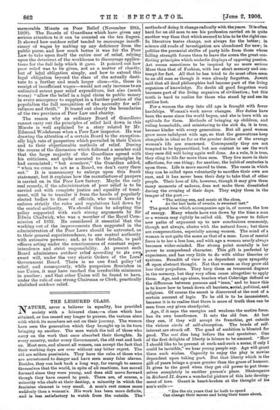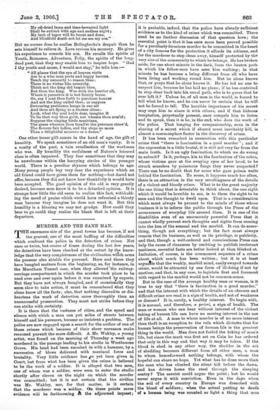THE LEISURED CLASS. N ATURE, never a believer in equality, has
provided society with a leisured class,—a class which has attained, or has ceased any longer to pursue, the various aims with which its members set out on their journey. The women have seen the generation which they brought np in its turn bringing up another. The men watch the toil of those who carry on the work that once absorbed their thoughts. In every country, under every Government, the old rest and look on. Most men, and almost all women, can accept the fact that their working days are over without any bitter regret. The old are seldom pessimists. They have the calm of those who are accustomed to danger and have seen many false alarms. Besides, they can look back a long way, far enough to assure themselves that the world, in spite of all reactions, has moved forward since they were young, and does still move forward though they have ceased to push. There are, of course, a ,minority who chafe at their destiny, a minority in which the feminine element is very small. A man's rest oomes more suddenly than a woman's. His work has been more definite, and is lees ,satisfactory to watch from the outside. The methods of doing it change radically with the years. it is often hard for an old man to see his profession carried on in quite another way than that which seemed to him to be the right one. In literature tastes change, not always for the better; in science old roads of investigation are abandoned for new; in politics the perennial strifes of party hide from those whose failing strength forces them to leave the arena the great con- flicting principles which underlie displays of opposing passion. Art seems sometimes to be inspired by no more serious Muse than that of Fashion, with her short memory and con- tempt for fact. All that he has tried to do must often seem to an old man as though it were already forgotten. Jowett said that all dead philosophies had become part of the living organism of knowledge. No doubt all good forgotten work becomes part of the living organism of civilisation; but this truth is hard to realise for those who stand by and see its outline lost.
For a woman the step into old age is fraught with fewer hardships. Woman's work never changes. Her duties have been the same since the world began, and she is born with an aptitude for them. Methods of bringing up children, and ruling households, and ministering to the sick do, it is true, become kinder with every generation. But all good women grow more indulgent with age, so that the generations keep alongside in ideal so far as the greater duties of the average woman's life are concerned. Consequently they are not tempted to be hypercritical, but are content to see the work they once did well being again well done. As a rule, it is true, they cling to life far more than men. They live more in their affections, for one thing; for another, the habit of centuries is upon them. Life is more sacred to them. The cases in which they can be called upon voluntarily to sacrifice their own are rare, and it has never been their duty to take that of other people. Their love of life, however, though it may give them many moments of sadness, does not make them dissatisfied during the evening of their days. They enjoy them in the temper of the poet "The setting sun, and music at the close,
As the last taste of sweets, is sweetest last."
The great loss which accompanies age is, of course, the loss of energy. Many wheels have run down by the time a man or a woman may rightly be called old. The power to follow new paths of argument up to new conclusions commonly, though not always, abates with the natural force; but there are compensations, especially among women. The mind of a woman is not quite the same as that of a man. Loss of mental force is to her a less loss, and with age a woman nearly always becomes wider-minded. Her strong point mentally is her power to comprehend character. This gift is perfected by experience, and has very little to do with either theories or systems. Breadth of view is as dependent upon sympathy at upon abstract thought. Not that women as they grow old lose their prejudices. They keep them as treasured dogmas in the memory, but they very often cease altogether to apply them. Age, and age alone, teaches what Coleridge defined as the difference between persona and "isms," and to know this is to know how to break down all barriers, social, political, and religions. Of course the secret is discovered at the cost of a certain amount of logic. To be old is to be inconsistent, because it is to realise that there is more of truth than can be seen from any given standpoint.
Age, if it saps the energies' and weakens the motive force, has its own beneficence. It sets the old free. At last they can, if they will accept its franchise, get outside the vicious circle of self-absorption. The bonds of self- interest are struck off. The goad of ambition is blunted for good. The moi dies long before the moi spectateur. One of the first delights of liberty is leisure to be amused. "How I should like to be present at such-and-such a scene, if only I could be invisible," we hear young people say. Age will grant them such wishes. Capacity to enjoy the play is nowise dependent upon taking part. But that liberty which is the gift of years .brings a grace greater than the grace of humour. It gives to the good when they get old power to put them- selves completely in another person's place. Shakespeare in Richard II. draws a wonderful picture of this late develop- ment of love. Gaunt is heart-broken at the thought of his son's exile
"Ere the six years that he bath to spend Can change their moons and bring their times &bent. My oil-dried lamp and time-bewasted light Shall be extinct with age and endless night; My inch of taper will be burnt and done, And blindfold death not let me see my eon."
But no sooner does he realise Bolingbroke's despair than he sets himself to relieve it. Love revives his memory. He gives his experience to console his son. He recalls the spirits of Youth, Romance, Adventure, Folly, the spirits of the long- dead past, that they may enable him to inspire hope. "Had I thy youth and cause, I would not stay," he tells him:—
"All places that the eye of heaven visits
Are to a wise man ports and happy havens.
Teach thy necessity to reason thus : There is no virtue like necessity.
Think not the king did banish thee, But thou the king. Woe doth the heavier sit, Where it perceives it is but faintly borne. Go, say I sent thee forth to purchase honour And not the king exiled thee; or suppose Devouring pestilence hangs in our air And thou art flying to a fresher clime :
Look, what thy soul holds dear, imagine it
To lie that way thou go'st, not whence thou conest ; Suppose the singing birds musicians, The grass whereon thou tread'st the presence strow'd, The flowers fair ladies, and thy steps no more Than a delightful measure or a dance." • One other lesser gift comes in the hand of age, the gift of humility. We speak sometimes of an old man's vanity. It is a vanity of the past, a vain recollection of the workman who was. By humility the usefulness of Nature's leisured class is often impaired. They fear sometimes that they may be unwelcome within the hurrying circles of the younger world. There is a peculiar shyness which belongs to age. Many young people buy very dear the experience which an old friend could have given them for nothing—but dared not offer, because they did not know how thankfully it would have been accepted. The good opinion of the old is very greatly desired, because men know it to be a detached opinion. It is strange how little the old seem to realise this fact, withhold- ing the meed of praise which would have refreshed a thirsty man because they imagine he does not want it. But this humility is a blessing we may not grudge. How could they bear to go could they realise the blank that is left at their departure.







































 Previous page
Previous page